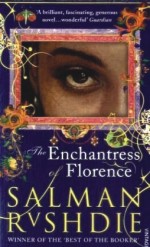Book Review
The Enchantress of Florence
A Boisterous Tale of Fantasy and History
Saad Adnan Khan
 Sir Salman Rushdie, whose genius cannot be expounded with mere ordinary words, presents us his most researched novel till date, The Enchantress of Florence. Owning up to titles like 'Controversial', 'Precocious' and of course 'Winner of the Best of the Booker', Rushdie enchants and dazzles by drawing parallels between the Mughal period of India (The reign of Akbar to be more precise) and Renaissance Florence in this mystical palimpsest of magic and tales with in the tale. Sir Salman Rushdie, whose genius cannot be expounded with mere ordinary words, presents us his most researched novel till date, The Enchantress of Florence. Owning up to titles like 'Controversial', 'Precocious' and of course 'Winner of the Best of the Booker', Rushdie enchants and dazzles by drawing parallels between the Mughal period of India (The reign of Akbar to be more precise) and Renaissance Florence in this mystical palimpsest of magic and tales with in the tale.
Rushdie's writing is a brand itself that usually acquire an independent streak in terms of plots and language, and his tenth novel is no different. He envisages a tale set in the epochs mentioned (even though historically there were not any direct connection between the time periods) when a handsome blonde Florentine who calls himself Mogor dell' Amore (the Mughal of love), arrives at Emperor Akbar's court to reveal a baffling tale of an enchantress by the name Qara Koz that would prove that the foreign traveler and the emperor share the same blood line, that this traveler, despite his tender age and a disparate city of origin, is infact Akbar's uncle.
Like Rashid the Shah of Blah in Rushdie's Haroun and the sea of stories, Rushdie, (as a critic calls him) a maker of mischief, a spinner of yarns, and an unrepentant digresser, intricately and intelligently mingles and merges myriads of enticing subplots that later on emerge as a dizzying whirlpool that hypnotizes and pulls the readers deeper and deeper into the labyrinthine tales. Readers plunge into a quest to figure out whether the claim made by the traveler is indeed true or not, and come across stories of mandrake hunt, albino giants, pirates, amorous perfumes, bordellos and pleasure palaces, Machiavellianism and politics and of course the magic of the enchantress, a mighty seductress whose beauty and power can make a whole city kneel in front her with love and admiration. Rushdie presents such marvels with his exuberant language, which is less obfuscate than some of his earlier works like The Satanic verses, and more ornate with touches of Petrarchan sonnets (that seep in an essence of Renaissance spirit) at the beginning, and rich with vivid and conspicuous details of the people and places of the time periods. Like his other works, Rushdie uses opulent magic realism to convey the theme of enchantment all through out the magical fable, where Dashwanth, the royal painter of the Moghul court, who was ministered to paint the enchantress, falls in love with her and becomes so obsessed that he disappears in the border of the painting or the life giving lake of the Moghul capital Fathepur Sikri, vanishes at the end of the novel, Rushdie does not fail to depict the impossible and bizarre in the most tangible way.
Along with the magic realism, the language is completely chutnified (one constantly comes across words like Jahapanah, huzoor, ishqbazi and more) and laced with dark humour that either shocks or makes the readers fall into scoffs and smirks. With such literary devices, Rushdie writes about how intellectually, socially and sexually alike the Mughals and Renaissance Florentines were.
The Enchantress of Florence is a sensuous piece of art that combines fantasy and history, by which Salman Rushdie proves yet again that he is indeed one of the most important living authors of modern time literature. The very quote of Saleem Sinai, from Rushdie's most acclaimed work Midnight's children, could signify a fraction of this literary giant's talent:
“I had entered the illusion of the artist and thought of the multitudinous realities of the land as the raw unshaped material of my gift. 'I can find out any damn thing!' I triumphed. 'There isn't a thing I cannot know”
Copyright
(R) thedailystar.net 2009 |
